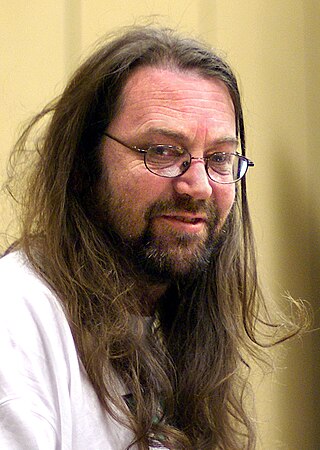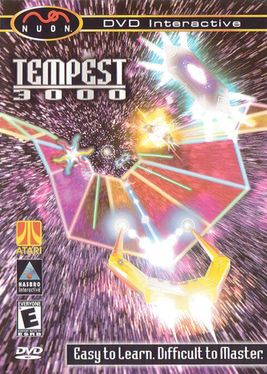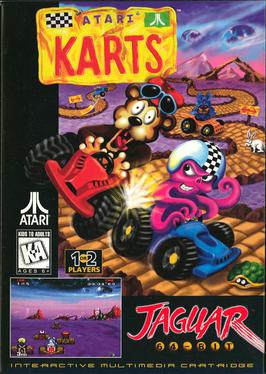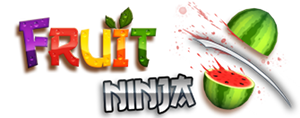
Nuon is a technology developed by VM Labs that adds features to a DVD player. In addition to viewing DVDs, one can play 3D video games and use enhanced DVD navigational tools such as zoom and smooth scanning of DVD playback. One could also play CDs while the Nuon graphics processor generates synchronized graphics on the screen. There were plans to provide Internet access capability in the next generation of Nuon-equipped DVD players.

Quake III Arena is a 1999 multiplayer-focused first-person shooter developed by id Software. The third installment of the Quake series, Arena differs from previous games by excluding a story-based single-player mode and focusing primarily on multiplayer gameplay. The single-player mode is played against computer-controlled bots. It features music composed by Sonic Mayhem and Front Line Assembly founder Bill Leeb.

Jeff Minter is an English video game designer and programmer who often goes by the name Yak. He is the founder of software house Llamasoft and has created dozens of games during his career, which began in 1981 with games for the ZX80. Minter's games are shoot 'em ups which contain titular or in-game references demonstrating his fondness of ruminants. Many of his programs also feature something of a psychedelic element, as in some of the earliest "light synthesizer" programs including Trip-a-Tron.

Soulcalibur is a weapon-based 3D fighting game developed by Project Soul and produced by Namco. It is the second game in the Soulcalibur series, preceded by Soul Edge in December 1995. Originally released in arcades on July 30, 1998, it ran on the Namco System 12 hardware. It was ported to the Dreamcast in 1999 with new features and improved graphics. The North American version was released in September 1999 as a launch game for the Dreamcast and was part of the successful launch of the new console. It became available as a downloadable title on the Xbox 360's Xbox Live Marketplace in July 2008 and it is forward compatible with the Xbox One along with the sequel, Soulcalibur II.

Script Creation Utility for Maniac Mansion Virtual Machine (ScummVM) is a set of game engine recreations. Originally designed to play LucasArts adventure games that use the SCUMM system, it also supports a variety of non-SCUMM games by companies like Revolution Software and Adventure Soft. It was originally written by Ludvig Strigeus. ScummVM is free software that is released under the terms of the GNU General Public License.

Paperboy is an arcade action game developed and published by Atari Games, and released in 1985. The player takes the role of a paperboy who delivers a fictional newspaper called The Daily Sun along a street on his bicycle. The arcade version of the game featured bike handlebars as the controller.
Homebrew, when applied to video games, refers to software produced by hobbyists for proprietary video game consoles which are not intended to be user-programmable. The official documentation is often only available to licensed developers, and these systems may use storage formats that make distribution difficult, such as ROM cartridges or encrypted CD-ROMs. Many consoles have hardware restrictions to prevent unauthorized development.

VM Labs was a semiconductor and platform company, founded in 1995 in Los Altos, Silicon Valley, California.

Tempest 3000 is a tube shooter video game developed by Llamasoft for the Nuon. It was published by Hasbro Interactive in North America on December 13, 2000, and Europe on March 2001. It is a follow-up to Tempest 2000, an updated remake of Dave Theurer's arcade game Tempest (1981). The player controls a claw-shaped blaster, shooting at enemies and obstacles, scoring points, and surviving multiple levels. The game modifies and builds upon the gameplay from Tempest 2000, introducing new enemies and mechanics.

Rockstar Vienna was an Austrian video game developer and a studio of Rockstar Games based in Vienna. Peter Baustädter, Niki Laber, and Hannes Seifert founded the studio as Neo Software in January 1993 as they neared the completion of Whale's Voyage. The game led Neo Software to early success, as did 1994's The Clue!, which sold over a million copies, and enabled the company to relocate from Seifert's house in Hirtenberg to offices in Vienna. After Neo Software's Alien Nations sold more than a million copies in 1999, Computec Media acquired a majority stake in the company, seeking it to produce online games. It then sold the studio and several other businesses to Gameplay.com in February 2000, which sold Neo Software to Take-Two Interactive in January 2001 as part of a subsidiary exchange.

Tak 2: The Staff of Dreams is an action-adventure platform video game developed by Avalanche Software and published by THQ for the GameCube, Game Boy Advance, PlayStation 2 and Xbox. It is the sequel to Tak and the Power of Juju and is the second installment to the Tak and the Power of Juju series. The PS2 version was ported to PlayStation Network as a "PS2 Classic" on November 29, 2011, but it was later taken off the store due to THQ's bankruptcy in 2013.

Atari Karts is a kart racing video game developed by Miracle Designs and published by Atari Corporation for the Atari Jaguar in North America on December 22, 1995, and Europe on January 1996. In the game, the players take control of one of several playable characters, each with differing capabilities. One or two players race against computer-controlled characters in four cups consisting of multiple tracks over four difficulty levels. During races, the players can obtain power-ups placed at predetermined points in the tracks and use them to gain an advantage. It plays similarly to Super Mario Kart and features Bentley Bear, main protagonist of the arcade game Crystal Castles (1983).
The 2000s was the fourth decade in the industry's history. It was a decade that was primarily dominated by Sony, Nintendo, newcomer Microsoft, and their respective systems. Sega, being Nintendo's main rival in the 1980s and 1990s, left the console market in 2002 in favor of returning to third-party development, as they once were. Overall the decade saw the last of the low resolution three-dimensional polygons of the 1990s with the emergence of high definition games, and often focused on developing immersive and interactive environments, implementing realistic physics, and improving artificial intelligence. The sixth and seventh generation of video game consoles went on sale, including the PlayStation 2, Xbox, GameCube, Xbox 360, PlayStation 3, Wii, Game Boy Advance, Nintendo DS and PlayStation Portable. Notable games released in the 2000s included Half-Life 2, Wii Sports, Grand Theft Auto III, BioShock, The Sims, Metroid Prime, Burnout 3: Takedown,Tony Hawk's Pro Skater 2, Resident Evil 4, The Legend of Zelda: The Wind Waker, Shadow of the Colossus,Grand Theft Auto: Vice City, Star Wars: Knights of the Old Republic, LittleBigPlanet, The Elder Scrolls III: Morrowind,World of Warcraft, Final Fantasy X, Perfect Dark, God of War, Left 4 Dead, Batman: Arkham Asylum, Counter-Strike, Prince of Persia: The Sands of Time,Diablo II, Pokémon Ruby and Sapphire, The Elder Scrolls IV: Oblivion,Super Smash Bros. Melee, Grand Theft Auto: San Andreas, Gears of War, Max Payne, Pokémon Diamond and Pearl,Super Mario Galaxy, Halo: Combat Evolved, Tony Hawk´s Pro Skater 3, Guitar Hero, Devil May Cry, Jak and Daxter: The Precursor Legacy, Ratchet & Clank, Sly Cooper and the Thievius Raccoonus,Hitman: Blood Money, Grand Theft Auto IV, Halo 2, The Legend of Zelda: Twilight Princess, Metal Gear Solid 2: Sons of Liberty, Fallout 3, Super Mario Sunshine, Rock Band, Beyond Good & Evil,Portal, Ico, Jet Set Radio, Silent Hill 2, Psychonauts, Uncharted 2: Among Thieves,Halo 3, Plants vs. Zombies, Angry Birds, and Call of Duty 4: Modern Warfare.
Engine Software is a Dutch video game developer, located in Doetinchem, Netherlands, which specialized in handheld video games and digital platforms until 2011. In the period after (2011-present) they have become more active and known for high-end ports and adaptations of games to modern consoles, mobile, PC and streaming services like Stadia and Luna. Some of the best known games they have worked on include Puzzle Quest for the Nintendo DS, Terraria for PlayStation 3, PlayStation 4, PlayStation Vita, Xbox 360, Xbox One and Wii U, Killer7 Remastered for PC, Ni No Kuni: Wrath of the White Witch for Nintendo Switch and No More Heroes / No More Heroes 2 for Nintendo Switch.
Hasbro Family Game Night is a series of video games that adapt board games manufactured by Hasbro.

Fruit Ninja is a video game developed by Halfbrick originally released on August 12, 2010. In the game, the player must slice fruit that is thrown into the air by swiping the device's touch screen with their finger(s) or the player's arms and hands, and must not slice bombs. It features multiple gameplay modes, leaderboards and multiplayer.
Halfbrick Studios Pty Ltd is an Australian video game developer based in Brisbane. The company primarily worked on licensed games until 2008. The company is best known for Fruit Ninja (2010), Jetpack Joyride (2011), and Dan the Man (2015). They create games for Windows, Xbox, PlayStation, Windows Phone, Android and iOS.

PPSSPP is a free and open-source PSP emulator for Windows, macOS, Linux, iOS, Android, Nintendo Wii U, Nintendo Switch, BlackBerry 10, MeeGo, Pandora, Xbox Series X/S and Symbian with a focus on speed and portability. It was released to the public on November 1, 2012, licensed under the GNU GPLv2 or later. The PPSSPP project was created by Henrik Rydgård, one of the co-founders of the Dolphin emulator.
The Xbox system software is the operating system developed exclusively for Microsoft's Xbox home video game consoles. Across the four generations of Xbox consoles, the software has been based on a version of Microsoft Windows and incorporating DirectX features optimized for the home consoles. The user interface, the Xbox Dashboard, provides access to games, media players, and applications, and integrates with the Xbox network for online functionality.

Iron Soldier 3 is an open world first-person mecha simulation video game developed by Eclipse Software Design and originally published by Vatical Entertainment for the PlayStation on 20 June 2000 and was ported to the Nuon in 2001. A sequel to Iron Soldier 2, it is the third and last installment of the Iron Soldier series.















